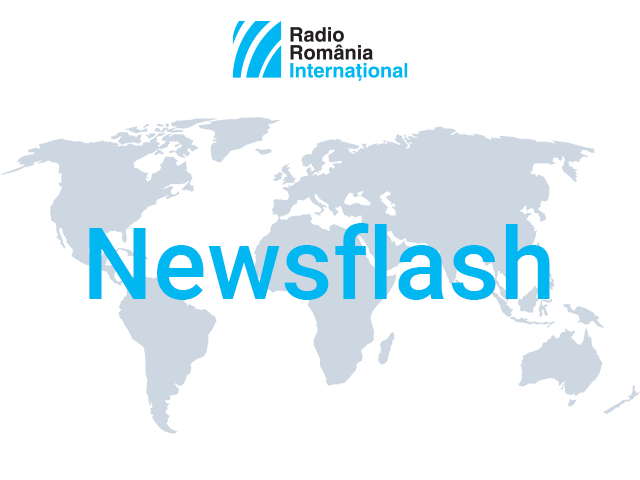January 1, 2022 UPDATE
A roundup of domestic and international news

Newsroom, 01.01.2022, 20:00
COVID-19 ROMANIA – Romanian authorities are preparing for the fifth wave of the pandemic. Experts say difficult times lie ahead due to the low vaccination rate, accounting for a little over 40% of the eligible population. The Public Health Institute warns that, in the worst-case scenario, as many as 25,000 daily infections could be reported at the peak of the 5th wave and 25,000 patients treated in hospitals, 1,500 of whom in intensive care. The infection rate continues to go up in Romania. The latest report announced 1,451 cases of infection and 27 related fatalities.
COVID-19 WORLD – An increasing number of countries are reporting infection surges as the Omicron strain becomes dominant. Italy and Turkey reported record-high numbers of infection. France has confirmed the Omicron strain has become dominant, accounting for over 60% of the total number of infections, compared to 15% last week. Health authorities say most people who got infected show no symptoms. The latest studies in the United Kingdom, where over 1 million people tested positive for COVID-19 within the space of a single week, show that the Omicron strain is less aggressive, the risk of hospitalization and death being only a third of the risk posed by the Delta strain. 2022 brings good news from the WHO, who announced the COVID-19 pandemic might be overcome this year, yet only if countries work together to contain the spread of the virus and prevent vaccine hoarding. Some 5.5 million people have died to the COVID-19 virus, and over 287 million got infected worldwide.
ROMANIA-EU – On Saturday, president Klaus Iohannis conveyed a message marking 15 years since Romania joined the European Union, expressing confidence the EU will continue to develop and answer to the challenges posed by digitization and climate change. EU membership has opened up free EU-wide travel for Romanians, providing them with labor and study opportunities. The free movement of goods gave Romanian businesses and products access to a huge market. At present, 80% of Romanias exports are EU-bound. In turn, EU funds have helped introduce a series of reforms. Starting 2007, a major transformation was the adoption of the EU principles for development and work tools. As a result, Romanias GDP per capita grew from 39% pre-accession to 59% nine years later. According to estimates, GDP per capita might reach 66.3% of the EUs average GDP in 2022.
INCREASES – The minimum wage will go up in Romania starting January 1, 2022, to 510 Euro, the pension point will also increase to 320 Euro, while the minimum welfare benefits will stand at 200 Euro. Benefits for children aged 2-18 will increase to 49 Euro, while children under 2 years of age or 3 in the case of children with disabilities will also see their benefits increased to 120 Euro. On the other hand, the excise for a number of products, including fuels and alcohol, will also go up. Electricity prices will also go up by up to 90% for some 3.7 million Romanians who havent signed new contracts on free market. However, the new tariffs will apply only starting April 1, 2022.
FEAST DAYS – On January 1, Romanian Orthodox and Eastern-Catholic Christians celebrated the feast day of Saint Basil the Great, a Byzantine bishop from Asia Minor. Also on January 1, Roman-Catholic Christians marked the Solemnity of Mary, Mother of God.
PRESIDENCY – On January 1, 2022, France took over the rotating presidency of the Council of the European Union. President Emmanuel Macron expresses his full commitment to turn 2022 into a “turning point” for Europe. The top three priorities of the French presidency are recovery, power and membership. High on the presidencys agenda is the post-COVID economic recovery of member states. France and Germany joined efforts to devise a joint recovery and resilience plan, which the 27 EU member states have already started implementing. Another important goal is to strengthen European sovereignty, providing the Union with military independence, a proposal Emmanuel Macron made during the presidential election campaign, alongside the reform of the Schengen area. Finally, technological progress, the digitization of society, the fight against climate change, social development, and the management of asylum and migration policies are also the focus of the six-month French presidency.
VISAS – The British government has announced temporary changes in the provision of health and care worker visas by adding care workers, care assistants and home care workers to the Shortage Occupation List, the Romanian Embassy in London announced. The measure has a temporary effect and will apply for a period of 12 months. Additionally, the Home Office announced the seasonal worker visa route has been extended until the end of 2024 to allow foreign workers to come to the UK for up to six months to harvest edible as well as ornamental crops. (VP)




























